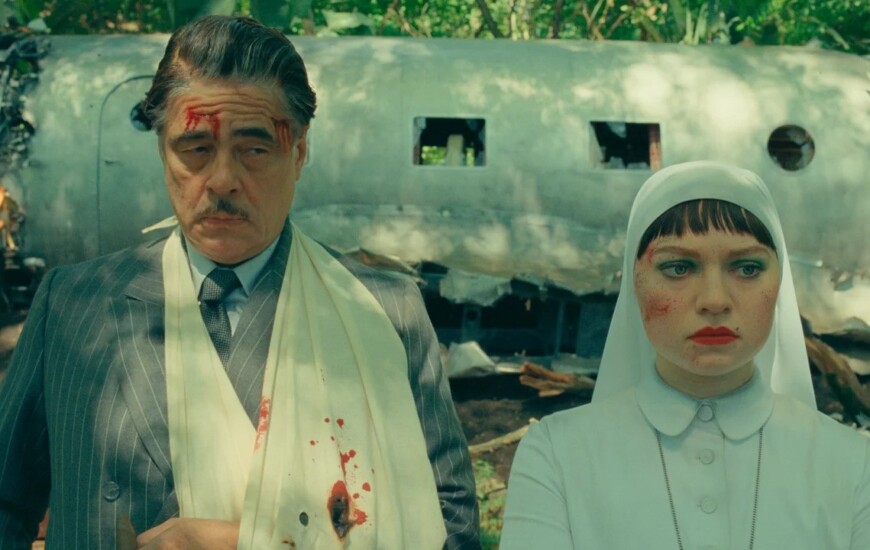The Phoenician Scheme is a minor key work from a major artist
Mike Finnerty 28 May 2025
The French New Wave was built on the tenets of French film critics who had seen every American and British movie and used those sensibilities to tell stories in their unique voice.
Over 60 years later, the coin has flipped; now, American directors are the ones cribbing from Europe.
This is apparent in the works of Wes Anderson, the most European person to ever come from Texas.
On Grand Budapest Hotel, he was paying homage to the central European stylings of Ernst Lubitsch and Billy Wilder, The French Dispatch was heavily inspired by the workings of French filmmakers Jean-Luc Godard and François Truffaut, and 2023’s Asteroid City (which made it onto our year-end list that year) was a homage to their compatriot Jacques Tati.
With his new film The Phoenician Scheme, Anderson turns his cinephile eyes to the British Isles, and more specifically, the works of Michael Powell and Emeric Pressburger.
The Archers, as they are more commonly known, were responsible for some of the great works of 20th-century British cinema, and their legacy has been kept alive by the likes of their protégé Martin Scorsese.
Their body of work informs the new outing from Anderson, a man who has become an unlikely brand.
When you mention the term “a Wes Anderson film” to the average person on the street, they have at the very least, a vague conception of what you are talking about; they might mention impeccably designed sets, quirky dialogue, or Bill Murray always being there.
Anderson plays all the hits with his new movie, which stars Benicio Del Toro and an army of movie stars.
Del Toro stars as Zsa-Zsa Korda, a hyper-wealthy industrialist who has cheated death time and time again.
After the latest attempt on his life, he hands over control of his empire to his only daughter, a nun played by Mia Threapleton.
Threapleton may not be a familiar name to audiences now (indeed, she’s a lot less famous than her mother Kate Winslet), but based on this performance, she is getting a one-way ticket to the A-list.
An underrated element of the Anderson films is how well he writes female characters, and Sister Liesl ranks right up there alongside Gwyneth Paltrow in Royal Tenenbaums or Anjelica Huston in The Life Aquatic.
Del Toro and Threapleton make for an unlikely double act; the cryptic hyper-capitalist and the nun who is wise beyond her years.
Their interplay and dynamics are a large part of why this film works as well as it does.
The final piece of the puzzle is Michael Cera, who has shockingly never been in a Wes Anderson film before.
After his first scene, it becomes obvious he should have been there all along.
Cera is as transformative to the Anderson project as Edwin Van Der Sar was to Manchester United in the mid-2000s.
Cera’s lovable weirdo streak made him a star all those years ago with Arrested Development and nearly stole Barbie from Margot Robbie and Ryan Gosling in 2023.
His specific brand of awkward, but likeable charm fits the Anderson-verse like a glove, and in the event that Bill Murray wants to throw in the towel, Anderson has found his successor for the next 50 years.
The cast in this film is top-notch and speaks to how much everyone wants to work with Anderson: Tom Hanks and Bryan Cranston show up for roughly 10 minutes and don’t have dialogue in the film again, Scarlett Johansson’s scene was presumably filmed in one afternoon, Riz Ahmed, Jeffrey Wright and Richard Ayoade add some spark but the big addition to the Anderson world is Benedict Cumberbatch.
Anderson finally won his Oscar last year for his short films, which adapted the works of Roald Dahl.
The big revelations from those films was seeing how perfectly Cumberbatch fit into the Anderson mould, and The Phoenician Scheme structures its story around a big final meeting with Cumberbatch’s character.
The film follows the Anderson formula to a tee; seemingly disparate, loosely connected stories where characters dip in and out eventually interlink.
Over the course of the film, Del Toro has to visit different people who are willing to pay for a major infrastructure project he doesn’t quite have the full funding for.
As the film progresses, and more funding is secured (or people pull out), the more important Cumberbatch’s role becomes, building up to a meeting with him that doesn’t quite deliver on the potential.
Cumberbatch himself gives a fantastic performance, but the character is made out to be this nefarious mastermind who is Del Toro’s equal.
Without going into spoilers, it doesn’t quite pan out that way, which somewhat undermines the inherent tension of the film and makes the previous 80 minutes pretty moot.
To focus too much on whether a character meaningfully drives the plot or not misses the forest for the trees somewhat; with Wes Anderson films, it has always been about the journey and not so much the destination.
In the grand scheme of things, The Phoenician Scheme is more of a minor key ditty than a power chord ballad; a minor work from Anderson, not one of his landmark ones.
There is a comforting truth in that, however; the most 3-star film by this guy is still heads and shoulders above studio committee-approved, based on a pre-existing property that usually floods Irish cinemas.
A new film from Wes Anderson is like when Bob Dylan releases a new album; no, it probably won’t be as good as Grand Budapest Hotel or Highway 61 Revisited, but you aren’t going to get this level of quality from anyone else.
Any director who homages A Matter Of Life And Death in a 2025 studio film is a-ok in our book.











